Table of contents
- Why Modern Farming Tools are Essential in India?
- 10 Essential Farming Tools for Indian Agriculture
- 1. Tractor
- 2. Plough
- 3. Cultivator
- 4. Seed Drill
- 5. Fertiliser Spreader
- 6. Sprayer
- 7. Harvester
- 8. Thresher
- 9. Rotavator
- 10. Power Tiller
- Importance of Choosing the Right Farming Tools
- Maintaining Your Farming Tools
- Conclusion
- Frequently Asked Questions (FAQs)
India, a land where agriculture forms the backbone of its economy, relies heavily on the efficiency and effectiveness of its farming practices. While traditional methods still hold their ground in some regions, the adoption of modern farming tools is steadily increasing, leading to higher yields and improved livelihoods for farmers. Choosing the right equipment is crucial for optimising farm operations, reducing labour costs, and ultimately, ensuring a prosperous agricultural future.
This article delves into 10 must-have agricultural equipments that are essential for farming in India. Whether you are a seasoned farmer or just starting, understanding the function and benefits of these farming tools will empower you to make informed decisions and enhance your agricultural productivity.
Why Modern Farming Tools are Essential in India?
- Increased Efficiency: Modern tools can perform tasks much faster than manual labour, saving valuable time and resources.
- Higher Productivity: Mechanisation leads to better soil preparation, precise sowing, and efficient harvesting, resulting in increased yields.
- Reduced Labour Costs: While the initial investment might seem high, in the long run, using machinery reduces the reliance on manual labour, which can be expensive and time-consuming.
- Improved Precision: Tools like seed drills and sprayers ensure accurate placement of seeds and fertilisers, minimising wastage and maximising resource utilisation.
- Better Quality of Work: Certain tasks, like deep plowing or uniform harvesting, are performed more effectively by machinery, leading to better quality produce.
- Addresses Labour Shortages: In many parts of India, there is a growing shortage of agricultural labourers, making mechanisation a necessity.
10 Essential Farming Tools for Indian Agriculture
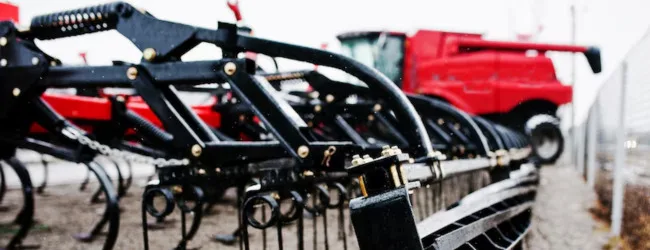
Here are 10 farming tools that are indispensable for modern agriculture in India:
1. Tractor
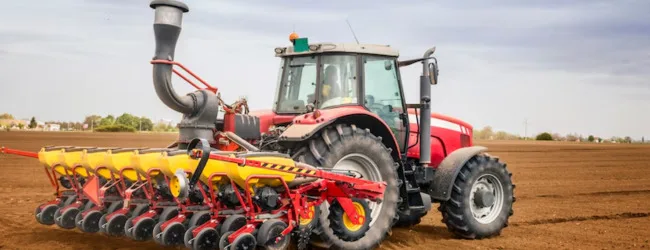
The backbone of modern farming. Tractors are versatile machines used for a wide range of tasks, from ploughing and tilling to hauling and operating other implements.
Elaboration: Tractors come in various horsepower (HP) ranges to suit different farm sizes and needs. In India, brands like Mahindra, TAFE, Sonalika, and John Deere are popular.
Indian Context: India is one of the largest tractor markets globally. According to the Tractor and Mechanisation Association (TMA), tractor sales in India reached a record high in recent years, indicating the increasing adoption of mechanisation.
2. Plough
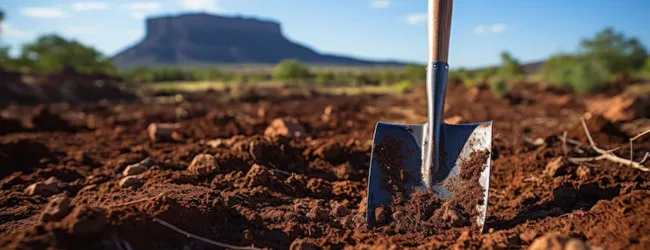
Essential for primary tillage, a plough turns and loosens the soil, preparing it for sowing.
Types: Common types include moldboard ploughs and disc ploughs. Mouldboard ploughs are effective in burying crop residues, while disc ploughs are better suited for the hard and rocky soils prevalent in some parts of India.
Benefit: Proper ploughing improves soil aeration and water infiltration, which are crucial for healthy crop growth.
3. Cultivator
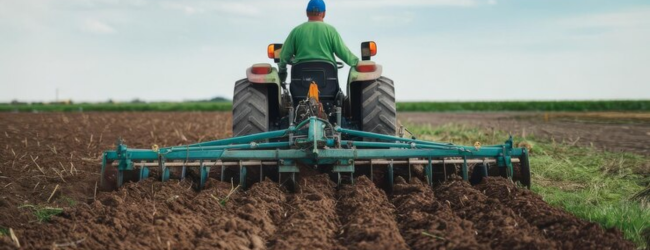
Used for secondary tillage, a cultivator breaks up the clods left after plowing and creates a fine seedbed.
Function: It also helps in weed control by uprooting young weeds.
Indian Relevance: With diverse cropping patterns across India, cultivators are widely used to prepare the soil for various crops like wheat, rice, and pulses.
4. Seed Drill
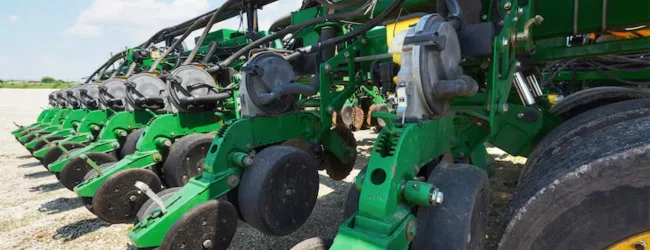
This farming tool ensures precise and uniform sowing of seeds at the correct depth and spacing.
Advantages: It saves time, reduces seed wastage, and ensures optimal plant population, leading to higher yields.
Indian Example: Many Indian farmers are now adopting seed drills for crops like wheat and soybean to improve germination rates and reduce labor costs associated with manual sowing.
5. Fertiliser Spreader
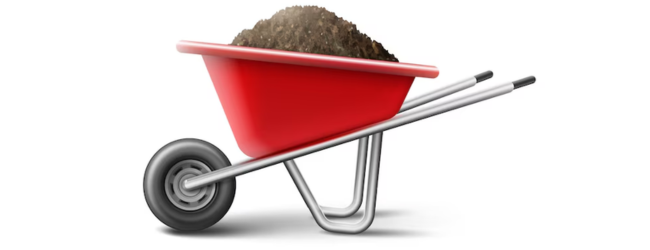
This equipment distributes fertilisers evenly across the field, ensuring that all plants receive the necessary nutrients.
Benefits: It prevents over-fertilisation in some areas and under-fertilisation in others, leading to uniform crop growth and better yields.
Types: Different types of spreaders are available based on the type of fertilizer (granular or liquid) and the size of the farm.
6. Sprayer
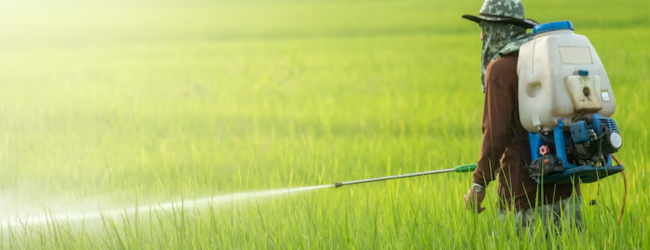
Used for applying pesticides, herbicides, and fungicides to protect crops from pests and diseases.
Importance: Timely and effective spraying is crucial for preventing crop losses and ensuring healthy harvests.
Types: Common types in India include knapsack sprayers (for smaller farms), tractor-mounted sprayers (for larger farms), and boom sprayers (for uniform coverage over large areas).
7. Harvester
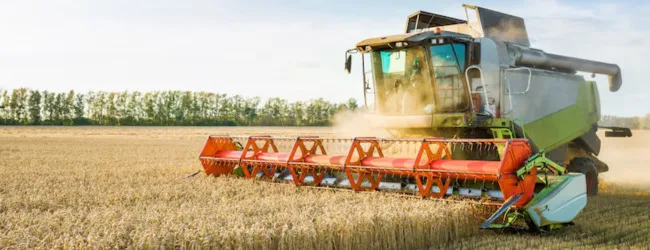
This farming tool is used to harvest mature crops efficiently.
Types: Combine harvesters are particularly popular as they perform multiple tasks like reaping, threshing, and winnowing in a single operation, especially for crops like wheat and rice.
Indian Scenario: The adoption of combine harvesters has significantly reduced the time and labor required for harvesting, particularly during peak seasons.
8. Thresher
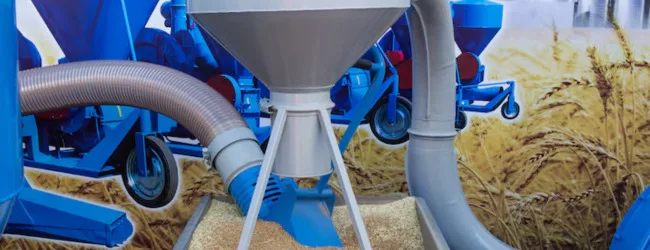
After harvesting, a thresher separates the grains from the stalks and husks.
Importance: It is a crucial step in post-harvest processing.
Indian Context: Threshers are widely used in India for processing various crops like wheat, paddy, and maize.
9. Rotavator
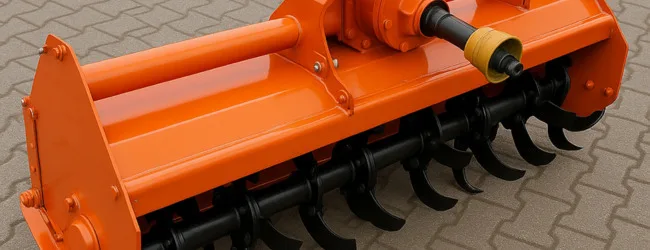
A versatile farming tool used for preparing the soil by breaking up clods and mixing soil. It can also incorporate crop residues into the soil, improving soil health.
Advantages: It saves time and fuel compared to traditional plowing and is particularly useful for preparing the soil for the next crop quickly.
Indian Adoption: Rotavators are gaining popularity in India due to their efficiency and ability to improve soil fertility.
10. Power Tiller
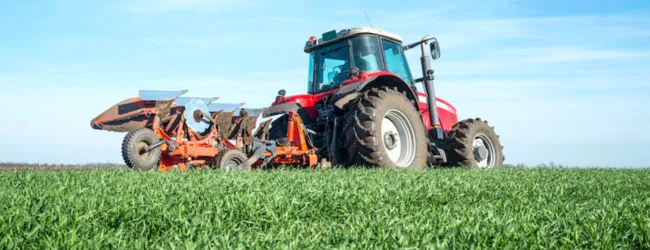
A smaller version of a tractor, power tillers are ideal for small and marginal farmers with smaller landholdings.
Function: They can be used for various tasks like ploughing, tilling, and weeding.
Indian Relevance: Given the large number of small and marginal farmers in India, power tillers play a significant role in farm mechanisation at the grassroots level.
Importance of Choosing the Right Farming Tools
Selecting the appropriate farming tools depends on several factors, including:
- Farm Size: Larger farms require more powerful and efficient machinery.
- Type of Crops Grown: Different crops may require specialised equipment.
- Soil Type: Some tools are better suited for specific soil conditions.
- Budget: The cost of agricultural equipment can vary significantly.
- Availability of Skilled Labour: Operating and maintaining modern machinery requires skilled personnel.
Maintaining Your Farming Tools
Proper maintenance is crucial for ensuring the longevity and optimal performance of your farming tools. Regular servicing, lubrication, and timely repairs can prevent breakdowns and extend the lifespan of your equipment, ultimately saving you money in the long run.
Need Expert Guidance?
Starting a business can be challenging, but you don’t have to do it alone! At Boss Wallah, our 2,000+ business experts are ready to provide valuable insights and guidance. Whether you need help with marketing, finance, sourcing, or any other area of any business, our business experts are here to help you succeed: https://bw1.in/1116
Confused about Which Business to Start?
Want to start your own business but unsure which one to choose? Explore Boss Wallah, where you’ll find 500+ courses by successful business owners, featuring practical, step-by-step guides on starting and growing various businesses.
Find your perfect business idea today – https://bw1.in/1111
Conclusion
Investing in the right farming tools is a critical step towards modernising agriculture in India. The 10 tools mentioned above represent essential equipment that can significantly enhance efficiency, productivity, and profitability for Indian farmers. As technology continues to advance, we can expect even more innovative farming tools to emerge, further transforming the agricultural landscape of India. By embracing mechanisation and making informed choices about their equipment, Indian farmers can pave the way for a more sustainable and prosperous agricultural future.
Frequently Asked Questions (FAQs)
1. What are the basic farming tools used in India?
Basic farming tools include ploughs, cultivators, seed drills, sprayers, and harvesters. The specific tools needed depend on the type of farming and the crops being grown.
2. How can I choose the right farming tools for my farm?
Consider your farm size, the types of crops you grow, your budget, the soil type, and the availability of skilled labour when selecting farming tools.
3. What are the benefits of using modern farming equipment?
Modern farming tools increase efficiency, boost productivity, reduce labour costs, improve precision in farming operations, and lead to better-quality produce.
4. Are there any government subsidies available for purchasing farming tools in India?
Yes, the Indian government offers various schemes and subsidies to encourage the adoption of modern farming tools. These schemes often vary by state and may focus on specific types of equipment or farmer categories. It’s best to check with your local agriculture department for the latest information.
5. How can I maintain my farming tools to ensure their longevity?
Regular cleaning, lubrication, timely repairs, and following the manufacturer’s instructions are essential for maintaining farming tools. Proper storage when not in use also helps prolong their lifespan.
6. What is the difference between a tractor and a power tiller?
A tractor is a larger and more powerful machine used for a wider range of heavy-duty tasks. A power tiller is smaller and less powerful, ideal for small landholdings and tasks like tilling and weeding in smaller areas.
7. Which farming tool is most important for increasing crop yield?
While all the listed tools play a crucial role, tools like seed drills (for precise sowing), fertiliser spreaders (for even nutrient distribution), and harvesters (for efficient harvesting with minimal loss) significantly contribute to increased crop yields.
8. Where can I buy good-quality farming tools in India?
You can purchase farming tools from authorised dealers of agricultural machinery companies, online marketplaces specialising in agricultural equipment, and sometimes through government agricultural departments or cooperatives.


